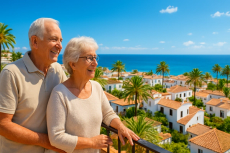Blog • Published on:June 20, 2025 | Updated on:June 24, 2025 • 10 Min
A Complete Guide to Living in Malta and Your Residency Options
Malta! One of the smallest countries in Europe, but one of the most desired places to live. Whether it’s the weather, the sea, or the lifestyle, something keeps drawing people in. And the growing list of opportunities, from flexible residency options to EU access, makes it even more attractive to those ready for a change.
In under three hours, you can reach most European capitals. And whether you're planning to work, retire, or live remotely, Malta offers straightforward residency paths that actually fit real-life needs.
In this guide, we cover everything from visas and neighbourhoods to healthcare, taxes, and daily living.
Let’s start with the real question: Why do so many people choose Malta?
Why Choose Malta as Your New Home
Who’s actually moving to Malta and why?
As of early 2025, foreign nationals make up nearly 31% of Malta’s population, with over 173,000 international residents now living on the islands. That’s a sharp increase from 2022, when the expat share stood just above 25%.
Most of these newcomers are working-age adults, and their median age is 32, compared to 43 for native Maltese.
What do residents get out of it?
Malta Residency Programs for Foreigners
Whether you're investing, working remotely, or looking to retire by the sea, Malta has legal pathways that fit. Below are the most relevant options available in 2025.
Malta Permanent Residence Program (Golden Visa)
Designed for non-EU nationals, this is Malta’s most accessible investment-based residency option. It offers long-term security, access to Europe, and family inclusion.
Key features:
- Who it's for: Investors and their immediate families seeking EU residency.
- Minimum total outlay: Around €455,000, which includes a mix of government contribution, property, and administrative fees.
- Property requirement: You can choose to buy real estate or rent, locations in southern Malta offer lower thresholds.
- Processing time: Approximately 3 to 4 months from application to approval.
- Residency type: Permanent residency with renewable 10-year residence cards.
- Travel access: Visa-free travel across the Schengen Zone for 90 days within any 180-day period.
- Family eligibility: Spouse, children (up to a certain age), and dependent parents or grandparents can be included.
- Tax benefits: No tax on foreign income not remitted to Malta, and no inheritance or wealth tax.
More details: Savory & Partners – Malta Residency by Investment
Malta Digital Nomad Permit
This permit targets digital nomads and remote workers earning income from outside Malta. It's flexible, modern, and built around a mobile work lifestyle.
Key features:
- Who it's for: Remote workers, freelancers, or business owners working with non-Maltese clients.
- Income requirement: Minimum gross monthly income of €3,500.
- Permit length: Issued for 1 year, with extensions possible up to 3 years total.
- Application timeline: Typically processed within 8 to 10 weeks.
- Tax status: No local tax on foreign-sourced income for the first 12 months. After that, a flat 10% tax rate may apply under special conditions.
- Family inclusion: Spouse and dependents may be added to the application.
- Other costs: Standard fees between €300–€600, and health insurance (~€40–€100/month) is required.
It's ideal for self-sufficient remote workers who want legal EU residence without investing large sums.
Malta Retirement Programme (MRP)
This program is tailored for EU, EEA, Swiss, and UK nationals who want to retire in Malta with favourable tax terms and clear property guidelines.
Key features:
- Who it's for: Retirees with a documented pension as their main source of income.
- Income requirement: At least €25,000/year from pension or retirement income.
- Taxation: Flat 15% rate on income brought into Malta, with a minimum tax liability of €7,500/year.
- Property requirement:
- Purchase real estate for €275,000+, or
- Rent property for €9,600/year (less in Gozo or South Malta).
- Stay requirement: Must live in Malta for at least 90 days/year and not exceed 183 days in any other country.
It’s one of the few EU retirement schemes still welcoming UK nationals post-Brexit, offering both financial predictability and legal residency.
To better understand what a residence permit is, including Maltese options, the different types available, and how they function across jurisdictions, explore our detailed guide: “Residence Permit: Definition, Types & Benefits”.
Best Areas to Live in Malta
Where you live in Malta can shape your entire experience, from cost of living to community feel. Here’s a breakdown of the most popular residential zones for expats, based on lifestyle, budget, and accessibility.
Sliema
One of the most expat-heavy towns in Malta, Sliema is modern, walkable, and well-connected. It blends urban comforts with waterfront views.
- High concentration of expats, especially young professionals and digital nomads.
- Seafront promenade, cafes, co-working spaces, and shopping malls.
- Direct ferry to Valletta and frequent public transport routes.
- Popular for long-term rentals and serviced apartments.
Keep in mind: It’s one of Malta’s pricier areas, with limited parking and high demand for real estate.
St. Julian’s
Often considered the nightlife and dining capital of Malta, St. Julian’s offers a polished vibe, high-end apartments, and luxury real estate.
- Home to Malta’s best hotels, marinas, casinos, and fine dining.
- Central to the gaming and fintech industries, ideal for businesspeople and executives.
- Properties with sea views and modern facilities dominate the area.
Keep in mind: Noise, traffic, and party crowds are part of the deal, especially in summer.
Valletta
Malta’s capital city is compact, UNESCO-listed, and packed with history, yet surprisingly livable.
- Dense with museums, theatres, historic streets, and Mediterranean architecture.
- No cars in much of the city center, perfect for walking and low traffic living.
- Close to government buildings, embassies, and cultural centers.
- Trendy boutique apartments in restored townhouses are in high demand.
Keep in mind: Parking is limited, and nightlife is more subdued compared to Sliema or St. Julian’s.
Mellieha
Situated in Malta’s north, Mellieha offers more room, slower pace, and family-friendly beaches.
- Quieter residential vibe with villas, bungalows, and townhouses.
- Close to sandy beaches like Mellieha Bay and Għadira.
- Good schools and space for larger families or retirees.
- Lower property prices than central areas.
Keep in mind: It’s less central, so having a car is often necessary for commuting.
Healthcare System in Malta
Malta’s healthcare consistently ranks among the best in Europe for accessibility and safety.
Here’s how the system works for residents, broken down into what’s public, what’s private, and what’s required.
Public Healthcare Access
Residents with a valid residence permit and a Social Security number are eligible for free public healthcare, including GP visits, hospital stays, and emergency treatment. Coverage applies to:
- Employed persons paying National Insurance.
- Spouses and dependents of qualifying residents.
- Pensioners receiving a Maltese state pension.
Private Medical Facilities
For faster access and more flexibility in choosing specialists, many residents opt for private clinics and hospitals. Leading private facilities include:
- St. James Hospital (Sliema & Żabbar) – Known for diagnostics, maternity, and outpatient surgeries.
- DaVinci Health (Birkirkara) – Focus on diagnostics and private GP care.
- The Capua Hospital – Offers day surgeries, dental, and specialist services.
Most private services are paid out-of-pocket or reimbursed through private insurance. GP consultations range from €20–€35, while specialist visits start around €50–€80 per session.
Health Insurance Requirements
- Mandatory for non-EU nationals during visa or residence permit application.
- Minimum coverage must include inpatient and outpatient care, hospitalisation, and repatriation.
- Annual policies for expats range from €250 to €800+, depending on age and coverage.
- EU nationals with an EHIC card may access emergency public care temporarily, but long-term stays still require local insurance.
Working and Business in Malta
Job Market Overview
Malta’s job market is dominated by sectors like iGaming, fintech, blockchain, aviation services, healthcare, and hospitality.
Most foreign professionals work in the private sector, where English is the default language.
As of last year, over 30% of Malta’s workforce is foreign. Work permits are typically issued within 4–6 weeks for EU nationals and 8–10 weeks for non-EU nationals, depending on employer accreditation.
Business Setup Process
Registering a business in Malta can take 5 to 10 working days, provided all documents are in order.
You’ll need a Maltese-registered office address, a local bank account, and a Tax Identification Number (TIN). Company types include Limited Liability Companies (Ltd), the most common choice for foreigners.
The minimum share capital is €1,165, with at least 20% paid up. Foreign directors are permitted, and businesses must file annual accounts.
Tax Benefits for Residents
Malta operates a remittance-based tax system for residents who are not domiciled in the country. Foreign income is not taxed unless brought into Malta.
Capital gains made abroad are exempt even when remitted. The corporate tax rate is 35%, but refunds of up to 6/7 are available to shareholders, reducing effective tax to 5–10% in many cases.
There’s no inheritance tax, no wealth tax, and no municipal taxes on property.
Legal Requirements for Living in Malta
Residence Permit Process
Non-EU nationals must apply for a residence permit through Identity Malta.
Required documents include a valid passport, proof of accommodation, health insurance, financial means, and, if applicable, a job contract or program approval.
Processing typically takes 6 to 12 weeks, depending on the permit type.
Property Purchase Rules
Foreigners can buy property in Malta with an Acquisition of Immovable Property (AIP) permit, unless they are EU citizens buying their primary residence.
The minimum property value for AIP purchases is €220,000 to €275,000, depending on the location.
In designated Special Designated Areas (SDAs), no AIP permit is needed, and purchases are unrestricted.
Bank Account Setup
To open a bank account, you need a residence card or proof of application, valid ID, and proof of address.
Most banks require an in-person visit. Account opening can take 1 to 3 weeks, and enhanced due diligence is standard, especially for non-EU applicants.
Building Your Future in Malta
From flexible residency routes to a lifestyle that balances work, travel, and well-being, Malta offers more than just a place to live, it offers options.
Whether you're investing, retiring, or working remotely, the legal pathways are structured, transparent, and designed to support long-term settlement.
If you're ready to take the next step, get in touch with Savory & Partners to find the program that fits your goals, and start building your future in Malta with clarity and confidence.
FAQs about Living in Malta
1. How long does it take to get a residence permit in Malta?
Non‑EU residents applying through Identity Malta can expect processing times of approximately 6–12 weeks, depending on the permit category (e.g. self-sufficiency, employment-based). These timelines are based on official Identity Malta processing standards.
2. Do I need permission to buy property as a foreigner?
Yes. Non-EU nationals must obtain an AIP (Acquisition of Immovable Property) permit unless buying in a Special Designated Area (SDA). The minimum purchase value ranges from €220,000 to €275,000 depending on location.
3. What documents are required for a permit application?
Applicants must submit a valid passport, proof of accommodation (lease or title), health insurance, financial statements, and any permit-specific materials (e.g. employment contracts). This aligns with Identity Malta's published checklist.
4. Can I open a bank account before my residence card arrives?
Yes. Many banks accept a residence application receipt instead of the final card, along with valid ID and address proof. This is consistent with standard banking practices for newcomers.
5. Does an EU national need a residence permit to live in Malta?
No. EU/EEA/Swiss citizens don’t need AIP permits to buy property and typically only register their residence through Identity Malta's Expatriates Unit, rather than going through the full third-country permit process.
References
Identity Malta Agency. (2024). Application form for residence permit.
Referred from: https://www.identitymalta.com/wp-content/uploads/2024/01/CEA_Form_M.pdf
Identity Malta Agency. (2024). Residency rights for EU/EEA/Swiss nationals.
Referred from: https://www.identitymalta.com/eu-eea-swiss-residency
Planning Authority Malta. (2024). Acquisition of Immovable Property (AIP) permits and designated areas. Referred from: https://www.pa.org.mt/en/aip-permit
Central Bank of Malta. (2024). Guidelines for opening a personal bank account in Malta. Referred from: https://www.centralbankmalta.org/account-opening-guidelines
Written By

Alice Emmanuel
Alice Emmanuel is an expert in residency and citizenship by investment, specializing in government compliance and program optimization. With over 8 years of experience, she has guided high-net-worth individuals through acquiring global mobility and new citizenships, particularly in Europe, the Caribbean, and the Middle East. Alice's in-depth knowledge of Middle Eastern residency programs makes her a trusted advisor for investors seeking security and diversification in the region.
Related Articles









Recently Published









Book a free consultation


